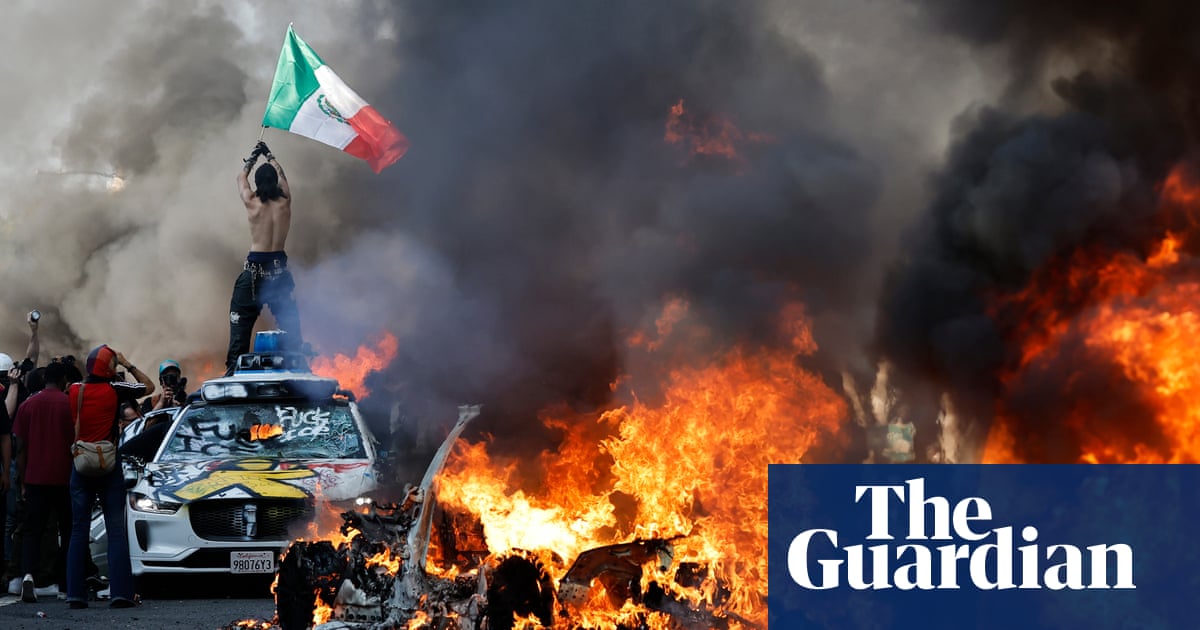California Governor Gavin Newsom Critiques Trump’s National Guard Deployment
In a dramatic escalation of tensions between state and federal authorities, California Governor Gavin Newsom has vocally criticized President Donald Trump over his recent decision to send 2,000 National Guard troops to Los Angeles. Newsom’s vehement rebuke likens Trump’s actions to those of a “dictator,” highlighting a deepening divide in American politics amid growing unrest.
The National Guard’s Presence in Los Angeles
The deployment of National Guard troops was spurred by widespread protests against Trump’s controversial anti-immigration program, which has incited significant backlash across various communities. On Sunday, clashing scenes erupted as National Guard units confronted demonstrators who marched against the administration’s policies. Tensions escalated as police utilized tear gas and rubber bullets to disperse large gatherings of protestors.
Footage captured from the scene depicted chaotic confrontations outside the Metropolitan Detention Center in downtown Los Angeles. Protesters took to the 101 freeway, effectively halting traffic as they voiced their dissent against Trump’s militaristic approach to immigration issues. The sight of demonstrators holding signs while facing off against law enforcement in tactical gear was emblematic of the growing conflict.
Newsom’s Call for Rescission of Deployment
In a passionate social media post, Governor Newsom condemned Trump’s decision, calling for the immediate rescission of the National Guard deployment. He accused the President of inciting violence and chaos while militarizing urban spaces. “These are the acts of a dictator, not a President,” he asserted, reflecting a broader sentiment held by many in his administration and among Democratic leaders across the country.
Newsom also shared an open letter signed by the nation’s Democratic governors, denouncing the move as an “alarming abuse of power.” This unified stance among Democratic leaders underscores a collective urgency to challenge perceived overreach by the Trump administration.
The Broader Implications of National Guard Deployment
Senator Bernie Sanders entered the fray, warning that such actions represent a concerning shift toward authoritarianism in the United States. He emphasized that neither the governor of California nor the mayor of Los Angeles requested National Guard assistance, framing Trump’s unilateral decision as an infringement on state rights. Sanders argued that the President’s approach erodes democratic norms and freedoms.
Threats and Counter-Threats
The confrontation did not end with protests. In an escalating exchange, U.S. Treasury Secretary Scott Bessent warned Governor Newsom that withholding federal tax payments could result in charges of “criminal tax evasion.” This warning came in response to Newsom’s prior threats to withhold state tax payments, seeking to push back against what he perceived as punitive funding cuts imposed by the Trump administration targeting Democratic-leaning California.
Notable Incidents of Misidentification
Amidst the unrest, a separate incident drew significant attention. U.S. immigration agents mistakenly detained a deputy marshal in Arizona, illustrating the chaotic state of law enforcement interactions. This incident happened when the deputy marshal matched a general description of a sought-after subject, underscoring the fraught atmosphere surrounding immigration issues and law enforcement’s often hasty decision-making processes.
Journalistic Responses and Criticisms
In the realm of media, ABC News suspended senior correspondent Terry Moran after he described White House aide Stephen Miller and President Trump as “world-class haters.” This suspension sparked discussions regarding journalistic integrity and the challenges of reporting on a politically charged landscape where commentators often find themselves at odds with prevailing narratives.
Broader Political Climate
Pope Leo also entered the discourse, criticizing the "exclusionary mindset" of nationalist movements globally. While not directly addressing the situation in the U.S., his comments resonated with many who are concerned about the rising tide of nationalism and its implications for societal cohesion and inclusivity.
The State of Affairs
As the nation grapples with these events, the divisions appear to widen, reflecting deeper sociopolitical fractures. Newsom’s and Trump’s stances symbolize more than just disagreements on policy; they signal a cultural divide that impacts the fabric of American society. The dialogue around these incidents will undoubtedly shape future political discourse in the lead-up to upcoming elections.


